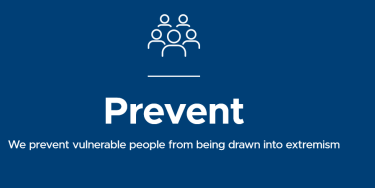British Counter Terrorism Thinks Reading Hobbes, Locke, Burke, Carlyle, C.S. Lewis, Tolkien, George Orwell, and Joseph Conrad May Produce Terrorists
Adam Smith, Aldous Huxley, Britain Sinking into the Sea, C.S. Lewis, Counter-Terrorism, Edmund Burke, George Orwell, Great British Railway Journeys, J.R.R. Tolkien, Joseph Conrad, Kenneth Clark, Thomas Carlyle

Counter Terrorism Policing \ What We Do \ Prevent
Be thankful every day that you don’t live in California or in Britain where the newest, craziest, and most extreme forms of contemporary insanity flourish, multiply, and metastasize in more outrageous and virulent forms every week.
Douglas Murray, in The Spectator, recently noted in an editorial that British Counter Terrorism’s Prevent’s “Research Information and Communications Unit” (RICU) identified some potential sources of indoctrination in right-wing extremism.
[A]ccording to RICU there were warning signs if people absorbed information or opinions from ‘pro-Brexit and centre-right commentators’. These included Jacob Rees-Mogg, Melanie Phillips, Rod Liddle and yours truly. So everybody reading this column is at as much risk of being ‘radicalised’ as some young Muslim settling down with a tape recording of Ayman al-Zawahiri or Osama bin Laden, and Rees-Mogg becomes the equivalent of a finger–waving imam sending the young off to become martyrs in the cause of Allah. Which is strange because he never came across that way to me when we crossed paths at Conservative Philosophy Group meetings.
I have since been able to look over some of this pathetic material provided at public expense and can confirm that it gets worse. In one RICU document a number of books are singled out, the possession or reading of which could point to severe wrongthink and therefore potential radicalisation. These include a book on the Rotherham rape gangs, books by Peter Hitchens, Melanie Phillips and – once again – me. Without wanting to beat my own drum, the book of mine that is singled out for this sinister treatment is my 2017 work The Strange Death of Europe. This book spent almost 20 weeks in the Sunday Times bestseller lists, has been translated into dozens of languages and was for some time the bestselling non-fiction book in the UK. So that is an awful lot of potential radicals just there. …
When I first saw these documents I felt a sort of white-hot anger. But then I read on and saw that these same taxpayer-funded fools provide lists of other books shared by people who have sympathies with the ‘far-right and Brexit’. Key signs that people have fallen into this abyss include watching the Kenneth Clark TV series Civilisation, The Thick of It and Great British Railway Journeys. I need to stress again that I am not making this up. This has all been done on your dime and mine in order to stop ‘extremism’ in these islands.
[Emphasis added.]
These include Leviathan by Thomas Hobbes, John Locke’s Two Treatises of Government and Edmund Burke’s Reflections on the Revolution in France, as well as works by Thomas Carlyle and Adam Smith. Elsewhere RICU warns that radicalisation could occur from books by authors including C.S. Lewis, J.R.R. Tolkien, Aldous Huxley and Joseph Conrad. I kid you not, though it seems that all satire is dead, but the list of suspect books also includes 1984 by George Orwell.
So in general, I begin to feel in good company. If government agencies are going to compile lists of suspect books, then I am very happy to stand condemned alongside these fine people, both living and dead.




